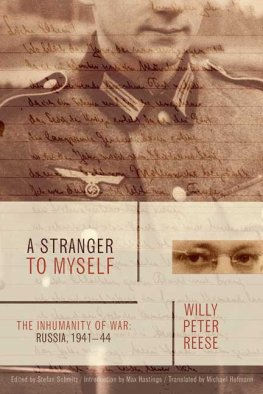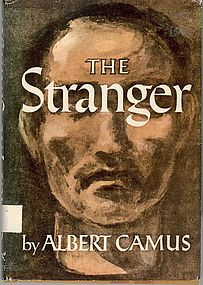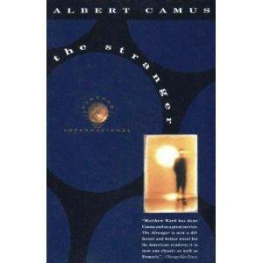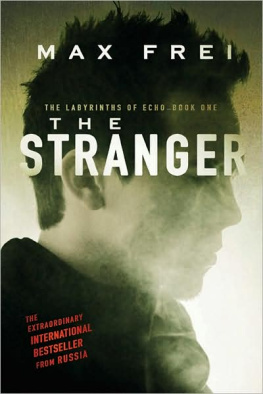Willy Reese - A Stranger to Myself
Here you can read online Willy Reese - A Stranger to Myself full text of the book (entire story) in english for free. Download pdf and epub, get meaning, cover and reviews about this ebook. City: New York, year: 2011, publisher: Farrar, Straus and Giroux, genre: Non-fiction / History. Description of the work, (preface) as well as reviews are available. Best literature library LitArk.com created for fans of good reading and offers a wide selection of genres:
Romance novel
Science fiction
Adventure
Detective
Science
History
Home and family
Prose
Art
Politics
Computer
Non-fiction
Religion
Business
Children
Humor
Choose a favorite category and find really read worthwhile books. Enjoy immersion in the world of imagination, feel the emotions of the characters or learn something new for yourself, make an fascinating discovery.
- Book:A Stranger to Myself
- Author:
- Publisher:Farrar, Straus and Giroux
- Genre:
- Year:2011
- City:New York
- ISBN:978-1-42999-875-8
- Rating:4 / 5
- Favourites:Add to favourites
- Your mark:
- 80
- 1
- 2
- 3
- 4
- 5
A Stranger to Myself: summary, description and annotation
We offer to read an annotation, description, summary or preface (depends on what the author of the book "A Stranger to Myself" wrote himself). If you haven't found the necessary information about the book — write in the comments, we will try to find it.
A Stranger to Myself — read online for free the complete book (whole text) full work
Below is the text of the book, divided by pages. System saving the place of the last page read, allows you to conveniently read the book "A Stranger to Myself" online for free, without having to search again every time where you left off. Put a bookmark, and you can go to the page where you finished reading at any time.
Font size:
Interval:
Bookmark:
Willy Peter Reese
A STRANGER TO MYSELF
The Inhumanity of War: Russia, 1941-1944

Foreword
For at least a generation after the conflict ended, the Western Allies sustained a historical image of the struggle against the Nazis in World War II that began with blitzkrieg and the Battle of Britain in 1940, then traced the campaigns in North Africa and Italy, followed by D-day in 1944 and the drive of Eisenhowers armies toward triumph on the Elbe. But little was known and less understood about the vast, misty struggle in the East between 1941 and 1945.
Today we have achieved a better perspective. We can see that the contest between the rival tyrannies of Hitler and Stalin was the decisive clash of the war, to which all else was subordinate. The United States made a critical contribution to the Soviet war effort, supplying aluminum, trucks, canned meat, radios, boots, and much else, without which the Red Armys advance to Berlin would have been difficult, if not impossible. It was the Soviets, however, who paid the overwhelming blood price necessary to defeat the Nazis, suffering the loss of some 27 million citizens against 1 million dead in the United States, Britain, and France combined. American and British ground forces killed some 200,000 Germans in North Africa, Italy, and Northwest Europe. The Soviets killed approaching 4 million.
There was never a low-cost shortcut to defeat a power as highly motivated, industrially mighty, and militarily proficient as Hitlers Germany. A long campaign of attrition was indispensable. It was fortunate for the peoples of the United States and Britain that this took place in the East. Implicitly recognizing Russia as the epicenter of bloodletting, the U.S. Chiefs of Staff made the decision to create only a relatively small U.S. ground army. General George Marshall wrote to Secretary of War Henry Stimson in May 1944: We have staked our success on our air superiority, on Soviet numerical preponderance, and on the high quality of our ground combat units. Marshall might have added: and on the willingness of the Soviets to accept the overwhelming burden of ground casualties.
A degree of sacrifice was demanded from the soldiers of the two tyrannies that never could have been made by those of the democracies. If Britain had been invaded by the Germans in 1940 or 1941, it is impossible to imagine, however bravely defending soldiers might have fought, that British civilians would have eaten one another rather than surrender. Yet that is what the defenders of Leningrad did from 1941 to 1942. Marshal Georgi Zhukov was probably the greatest commander of the war, yet his feats of arms were achieved by the exercise of a ruthlessness unthinkable in Dwight Eisenhowers armies. When Zhukov led the defense of Leningrad, he stationed tanks behind his own front not to kill Germans but to shoot down any of his own men who sought to flee. The Red Army shot 167,000 of its own men for alleged desertion or cowardice in 194142 alone.
The most important if of World War II is to consider how long it might have taken to break Hitlers dominion of Europe, if he had not chosen to invade the Soviet Union. From the outset, the creation of an Eastern empire, the pursuit of lebensraum for the German people in the vast expanses of Russia, was central to the Nazi program. Hitler told his generals that a single campaign would suffice to crush the rotten edifice of bolshevism. He was extraordinarily ignorant of the industrial power of the Soviet Union, and rejected evidence of its potential. When the Wehrmacht suggested early in 1941 that Russia was already building more tanks and aircraft than Germany, Hitler swept aside the claim, though in truth Axis intelligence estimates of Russian production were too low.
Any notion that Germanys generals were not complicit in Nazi atrocities can be dismissed after an examination of staff studies made before Operation Barbarossa was launched. German plans required the systematic starvation of millions of Soviet subjects, to remove their grain and foodstuffs westward to feed the German people. There is no evidence that Hitlers senior commanders raised any objection to this diabolical vision. The purpose of Germanys war in the East was to enslave the Soviet peoples, no more and no less.
Yet even the Fhrer suffered moments of apprehension about war with Russia. When Goering sought to flatter him before Barbarossa, asserting that his greatest triumph was at hand, Hitler sharply rebuked his marshal: It will be our toughest struggle yetby far the toughest. Why? Because for the first time we shall be fighting an ideological enemy, and an ideological enemy of fanatical persistence at that. And one day at the Wolfs Lair, Hitlers headquarters in East Prussia built expressly for the invasion, he voiced unease to one of his secretaries about what lay ahead: We know absolutely nothing about Russia. It might be one big soap bubble, but it might just as well turn out to be very different. The German army, which attacked at three a.m. on the morning of June 22, 1941, possessed 140 divisions, of which 17 were armored and 13 mechanized, with 7,100 guns, 3,300 tanks, 2,770 aircraftand 625,000 horses. In a rare invocation of any higher power than himself, Hitler concluded a message to his three-million-strong host: May the Lord God help us all in this struggle!
Within a week, the armies of Leeb, Bock, and von Rundstedt were deep inside Russia, sweeping aside the ruined divisions of Stalin, taking prisoners in the hundreds of thousands. Guderians armored spearheads had advanced 270 miles. Staff at the Wolfs Lair asked the Fhrer why he had not troubled to provide even a pretext for his assault, far less a declaration of war. Nobody is ever asked about his motives at the bar of history, Hitler answered contemptuously. Why did Alexander invade India? Why did the Romans fight their Punic wars, or Frederick the Great his second Silesian campaign? In history it is success alone that counts.
Some officers on Hitlers staff suffered their first spasms of doubt about the rationality of their leader during those weeks of triumph in Russia. Perceiving victory, Hitler instructed his planners to prepare a blueprint for an onward march to British India. Thoughtful senior subordinates began to understand that their nation was led by a man who possessed no ultimate vision of a peaceful universe. His only policy was unremitting struggle, until there were no enemies left to resist his hegemony.
Private Willy Reese, the author of this memoir, joined the German army in Russia that autumn of 1941, just as the heady sensations of success were being replaced by stirrings of fear. The enemys resistance was stiffening. An awareness of the illimitable scale of Russia was seeping through the ranks. The first frosts of fall were harbingers of the deadliest foe of allwinter. Hitler had made no provisions for a long campaign, least of all to supply arctic clothing to his soldiers. When cold such as men had never known began to grip their bodies, to seize up their weapons and vehicle engines, in desperation they were driven to line their clothing with newspapers, for they had nothing else. Shortages of fuel, ammunition, spare parts, aircraft, and bombs started to assail the German armies, in the absence of planning for long-term war production.
Meanwhile, on the other side, the men and women of Mother Russia were accomplishing miracles of endurance and sacrifice to sustain their own struggle. Whole factories were shipped by train beyond the Urals, machinery reassembled in the icy wastes of Siberia, where workers labored, sometimes without benefit of roofs, to build tanks and planes to resist the fascist hordes. Those who weakened were shot or dispatched to the camps of the Gulag, where they died of cold and hunger in the hundreds of thousands. Raw recruits were driven into action unarmed, with orders to pick up the rifles of the dead. Stalins commissars vied with Hitlers soldiers in mercilessness. When Russians retreated, they burned the villages of their own people, to leave no shelter for the invader. When Russians were captured by the Germans, many were killed out of hand, while others were conscripted as porters and auxiliaries for Hitlers legions.
Font size:
Interval:
Bookmark:
Similar books «A Stranger to Myself»
Look at similar books to A Stranger to Myself. We have selected literature similar in name and meaning in the hope of providing readers with more options to find new, interesting, not yet read works.
Discussion, reviews of the book A Stranger to Myself and just readers' own opinions. Leave your comments, write what you think about the work, its meaning or the main characters. Specify what exactly you liked and what you didn't like, and why you think so.












